New!! Full-length 16S rRNA sequencing
The Microbiome Core now offers full-length 16S sequencing on the PacBio Revio for higher accuracy and better taxonomic resolution, supporting species level identification for your microbial community studies. Contact us for more information.
We provide microbiome services beginning with experimental design through data interpretation of the results obtained from various microbial assays. We have well-established protocols for DNA extractions from diverse sample types and amplicon analysis for 16S and 18S (Illumina MiSeq), as well as full-length analysis of 16S and ITS (PacBio Revio). All procedures are performed in dedicated hoods to minimize the possibility of background or cross contamination during sample processing.
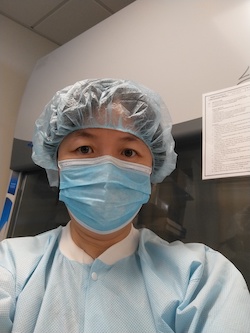
Project management
- SOPs for all processes
- study design
- sample tracking
Aliquoting samples (fecal, oral)
- aliquot frozen aliquots into cryovials
- maintain, organize and QC inventory of samples for project
Nucleic Acid extraction
- Qiagen DNA kits (Powersoil Pro)
- Qiacube HT automated extraction
- ZymoBIOMICS DNA Miniprep
- others available upon request
Sample Quality Assessment and Shearing
- Qubit
- Agilent Bioanalyzer 2100 assays
- Nanodrop
Microbiome Profiling
- 16S sequencing via Earth Microbiome Project protocols for V4, V1-V3
- 18S sequencing via Earth Microbiome Project protocols
- ITS sequencing via Earth Microbiome Project protocols
- PacBio Kinnex full-length16S sequencing
- PacBio Kinnex full-length ITS sequencing
- Metagenomic sequencing, visit Sequencing and Genomic Technologies Core
Agilent Bioanalyzer
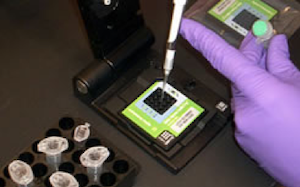
The Agilent Bioanalyzer DNA assay leverages microfluidics technology, enabling the quality analysis of DNA using only 1ul of sample. The assay is run on the Agilent 2100 Bioanalyzer instrument and utilizes the Agilent 2100 Expert Software to analyze and display results. RNA and DNA fragment sizes and concentrations are generated for each sample.
Please use the guidelines below to dilute your samples to the appropriate range BEFORE submitting them for Quality Check. Also, please provide 4ul of sample for quality check. DNA must be stored at -20C and RNA must be stored at -80C.
Assay types and information:
- DNA Analysis Kits and Reagents: Details and Specifications
- Agilent High Sensitiviy DNA
- Checking your Agilent High Sensitivity DNA Assay Results
- RNA Analysis Kits
Qubit Fluorometer
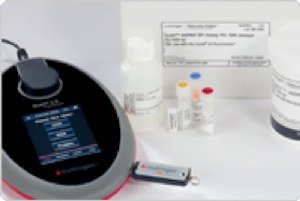
The Qubit 2.0 Fluorometer quantitates DNA, RNA, and protein with unprecedented accuracy, sensitivity, and simplicity. It is designed for molecular biology labs that work with precious samples that are rare or difficult to process and applications requiring precise measurement, such as real-time PCR.
| Assay Type | Size Range | Concentration Range | Max # of samples per chip |
| Bioanalyzer High Sensitivity DNA | 50 - 7000 bp | 0.005 - 0.5 ng/ul | 11 |
| Qubit dsDNA HS | any | 0.001 – 0.5ng/ul | NA |
| Qubit dsDNA BR | any | 0.1 - 1000 ng/ul | NA |
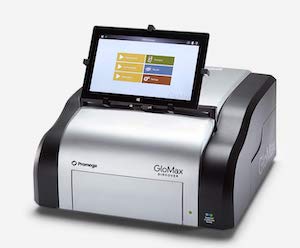
Promega Glomax Discover
Promega GloMax® Discover is a ready-to-use multimode plate reader developed with Promega reagent chemistries to provide a simple means of detecting luminescence, fluorescence and absorbance. This advanced plate reader provides flexible use of filters and includes high-performance luminescence, fluorescence, UV-Visible absorbance, BRET and FRET, two-color filtered luminescence and kinetic measurement capabilities.
GeoMx Digital Spatial Profiling
The GeoMx platform enables spatially resolved protein and transcript profiling for analysis of FFPE and fresh frozen tissue samples. This service is provided in collaboration with the Duke BioRepository and Precision Pathology Center. If you are interested in starting a project, please contact Dr. Jadee Neff for more information.
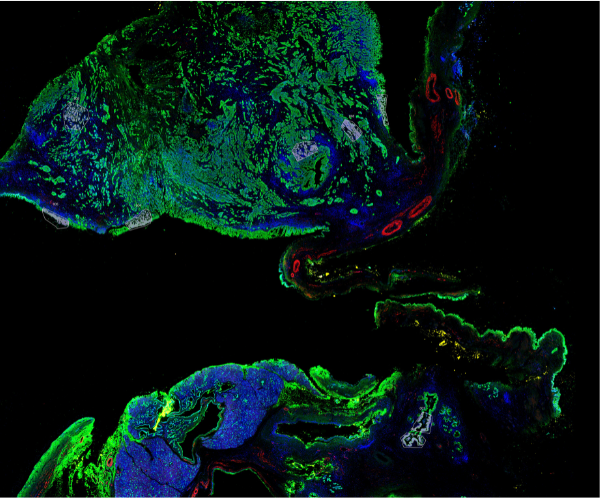
Nanostring Gene Expression Profiling
Step 1: Schedule a consultation by emailing us at microbiomesr@duke.edu prior to experiment and sample submission. We will also include a NanoString representative if needed for the consultation.
Step 2: Select from predesigned panels or design your own panel. Contact support@nanostring.com for NanoString panel information. For technical support contact jmadrigal@nanostring.com.
Step 3: Refer to the table for information on the sample requirements and preparation guide.
Step 4: Submit service request and sample information via our online submission form. Sample requirements depend on sample type and panel, contact us at microbiomesr@duke.edu for details.
Step 5: Submit samples to the core at MSRB3 at prearranged time.
Data Analysis and Computational Resources:
Packages for standard analysis of 16S and 18S amplicon or full-length sequencing data are available through the core. Additional custom and statistical analysis, including correlation and differential abundance, are available on an hourly consultation basis.
For specific analysis questions and the opportunity to interact with your Microbiome colleagues, the Duke Microbiome Center also hosts biweekly Microbiome office hours and a bioinformatics/biostatistics working group.
Data Management:
Data will be returned to the investigator by SFTP (NGS results from Duke Sequencing and Genomic Technologies Core) or through DukeBox (all other data). Instructions will be sent to investigator on how to download the data once results are posted. Please note that all investigators will be responsible for long term storage and sharing of data generated for their projects. If you would like assistance with depositing data into the SRA database, please contact us.
Please contact us for the most up-to-date rates at microbiomesr@duke.edu.